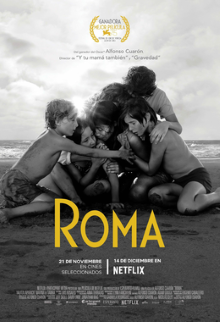
The critical consensus is that Roma is the best film of 2018 so watching this is certainly a must. I don’t think that it is the very best even with 2018 not being a very good year for films but it is a very strong contender. It is also easily one of the most technically impressive films I’ve seen all year and I’m amazed that Alfonso Cuarón managed to pull off a project of this scope.
It’s the early 1970s and Cleo Gutiérrez, a Mexican Native American, is a maid in an affluent household in Mexico City. Together with another maid, she takes care of a family of two parents, a grandmother, four children and a dog. Though the children are happy and oblivious, the marriage is strained as the father Antonia leaves for long trips abroad. Cleo dates a young man introduced to her by her fellow maid but the man abandons her after learning that she is pregnant. In the background are events in Mexico of the period: a New Year gathering at hacienda owned by a well-to-do friend of the family, an earthquake, Cleo’s erstwhile training martial arts as part of what is really a private militia, a student protest in front of a university that turns violent when it is suppressed by government goons and so on.
This film is technically perfect and exquisitely beautiful. It is in fact the polar opposite of An Elephant Sitting Still that we’ve watched recently. The cinematography favors wide-angle lenses, even inside the house where Cleo works for example, with incredible depth of field so that every detail of the background is crisply in focus. And there is so much detail to see in this film, the lived-in yet comfortable house, the busy streets of Mexico City, the liveliness of a New Year party, Cleo walking across muddy unpaved roads while a political rally is going on. You soon realize that this film isn’t really about Cleo and the family she works for, it’s more about capturing the Mexico of that era. The effect is muted on us Asians of course yet one imagines that the sense of nostalgia it evokes in Mexicans must be powerful indeed. We’re too used to seeing period American and British films so it feels wonderful to see the Mexico of the 1970s from the perspective of a director who knows it intimately. The amount of work that must have gone into recreating all this is mind-boggling.
The plot is ordinary material but it is enhanced by the parallel stories told of Cleo and her employer Sofia who are women, albeit of vastly different social classes, having to struggle past their problems with the men in their lives. I do dislike how Cuarón keeps insisting on having dramatic events happen wherever the characters go as though their lives alone aren’t interesting enough. It removes some of the emotional impact of the individual stories as they seem to be reduced in importance and makes the film even more about the era. Also annoying is how he keeps inserting a plane flying across the sky as part of the backdrop. It’s perfect the first time he does it but he repeats the trick so often that it becomes predictable and silly. These choices make me feel that Roma is still a film that is aimed at a wider, more mainstream audience than most artistic works.
Roma is excellent on all counts and surely is one of the best films of the year. It’s an eye-opening view for people who only know of Mexico through stories of drug kingpins and I would love to see this treatment applied to more countries. I am also amused that this cements further Cuarón’s reputation as a technical director. The compositions and cinematography in here are beautiful but even working on such a personal, intimate project, the emotions are experienced at a remove and it is the technical prowess of the director that comes through most strongly.